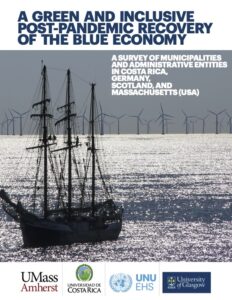Who is a member?
Our members are the local governments of Massachusetts and their elected and appointed leadership.
 A new survey led by UMass Amherst that examines the post-pandemic recovery of Massachusetts cities and towns highlights both progress and persistent challenges in rebuilding local economies while advancing sustainability efforts.
A new survey led by UMass Amherst that examines the post-pandemic recovery of Massachusetts cities and towns highlights both progress and persistent challenges in rebuilding local economies while advancing sustainability efforts.
Conducted in collaboration with the MMA, the project surveyed municipalities across the Commonwealth to assess the economic impact of COVID-19 and the role of green recovery strategies.
“Green economic development strategies offer long-lasting benefits, including the creation of new good jobs in numerous sectors such as energy, construction, transportation and waste management,” said lead researcher Marta Vicarelli, assistant professor of economics and public policy at UMass Amherst, in a prepared statement on April 9. “Local economies will be strengthened by an increased clean energy supply, and communities will benefit from reduced pollution and improved public health.”
Economic disruption
Based on responses from 111 of the state’s 351 municipalities, Vicarelli found the pandemic severely disrupted local economies and government operations, with 95% of municipalities reporting moderate to severe impacts on municipal services between early 2020 and mid-2021. The hospitality, education and health care sectors were among the hardest hit, with 66% of cities and towns noting severe impacts on K-12 schools and/or higher education.
Despite these setbacks, 99% of the municipalities surveyed reported at least partial recovery by early 2024. While 41% said they had fully returned to or exceeded pre-pandemic economic conditions, many local governments cited workforce shortages, inflation, and shifts in consumer behavior as ongoing barriers to full recovery. Respondents also noted that labor shortages, particularly in service industries, continue to limit economic growth.
One municipal official remarked that COVID was a major catalyst in accelerating workforce challenges that were already looming due to retirements and demographic shifts. Others pointed to increased costs and supply-chain disruptions as lingering obstacles.
Green recovery strategies
The survey found that nearly half (46%) of Massachusetts cities and towns have actively discussed green recovery strategies, with many already implementing sustainability-focused programs.
Popular initiatives among these communities include the following:
• Energy efficiency programs: 80% of municipalities reported investments
• Electric vehicle infrastructure: 69% of municipalities have installed or expanded EV charging stations
• Renewable energy capacity: 62% of municipalities have funded solar, wind or other clean energy projects
• Nature-based solutions: More than half of cities and towns have adopted stormwater management projects, such as rain gardens and bioswales (vegetated channels that collect and filter stormwater runoff), to mitigate climate risks.
The survey shows municipal leaders overwhelmingly support further investment in sustainability, with the majority ranking clean energy adoption, environmental policy integration, and nature-based infrastructure as top priorities. Many officials, however, expressed concerns about funding and staffing shortages. They emphasized the need for increased state and federal support, streamlined grant processes, and technical assistance to execute green projects effectively. Some called for policy changes to improve local climate adaptation efforts and incentives for community-led energy projects.
Vicarelli says the findings reflect Massachusetts’ leadership in green recovery efforts, with municipalities showing a strong commitment to integrating sustainability into their economic rebound. She notes, however, that continued investment in workforce development, funding mechanisms and regulatory support will be crucial to ensuring long-term resilience for the state’s coastal communities.
The survey was conducted as part of a transnational comparative study examining how coastal communities in Massachusetts, Costa Rica, Germany and Scotland recovered from the pandemic.
Researchers from the University of Glasgow, the United Nations University and the University of Costa Rica also participated in the project. The study received support from the U.S. National Science Foundation, the German Federal Ministry of Education and Research, the Canadian International Development Research Centre and UK Research and Innovation.